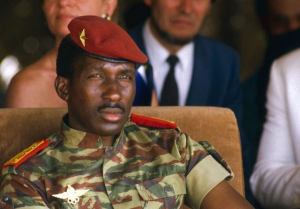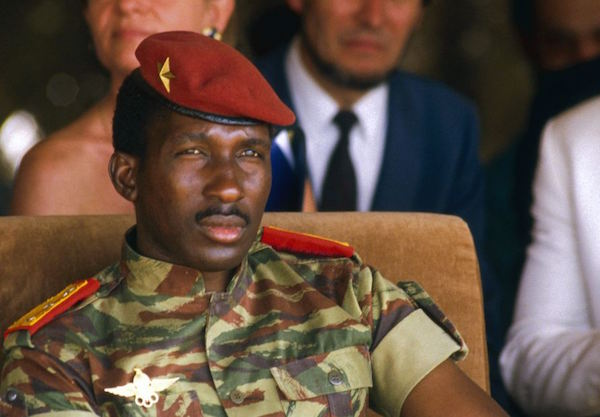Thirty years ago, the leader of Burkina Faso’s revolution, Thomas Sankara, was cut down in a hail of bullets — a bloody end to a turbulent yet charismatic life that today has gained cult status in Africa.
The young army captain who took power in the deeply poor nation in 1983 has been nicknamed “Africa’s Che Guevara,” a monicker that reflects his anti-imperialist convictions almost as much as the way he died.
“Kill Sankara and thousands of Sankaras shall be born,” he is said to have declared in 1987. Just a few months later he would be assassinated as he headed to a government meeting.
Born on December 21, 1949, at Yako in the dusty north of what was then Upper Volta, the future officer was 12 when his homeland attained independence from France.
Once in power after an August 1983 coup, Sankara would rebaptise the country Burkina Faso, or “land of upright men”, and introduce progressist policies that distanced his regime from other former colonies in what France regarded as its backyard in Africa.
His first taste of military action came during a conflict with neighbouring Mali in 1974-75.
But he was already nursing ideas that, along with popularity, brought a shadowy side to his rule.
After a successful coup in November 1980, the new head of state, Colonel Saye Zerbo, appointed Sankara junior minister of information. But his radical outlook led him to quit the government a year and a half later.

By the next coup in January 1983, Sankara was back in favour and became prime minister, but a power struggle erupted within military ranks.
– Breaking with colonial ways –
Initially arrested in May 1983, Sankara made his comeback in August, following a coup led by his close friend Captain Blaise Compaore and associates who put him in charge of the country.
Just turned 33, Sankara cast himself as the symbol of a proud, young Africa.
The image was a stunning break from that of the paunchy corrupt leaders who emerged from the end of colonial rule.
The new head of state was lean and good-looking, with a ready smile, a love of football and other sports and an accomplished jazz guitarist who liked nothing more than to jam with other musicians.
But he was also a hard-working authoritarian who slept little and always wore battledress, with a mother-of-pearl pistol tucked into his belt — a gift from North Korean leader Kim Il Sung.
He lived with his wife and two sons in a rundown presidential palace and his main worldly goods were a guitar and a second-hand Renault 5.
He ordered government ministers to use similar cars and forsake their limousines — a demand that cemented his huge popularity among the poor, especially in the countryside.
– ‘Decolonise mentalities’ –
Sankara’s priority policies were to clean up public finances and trim a bloated civil service, to bring improvements in health, to increase access to education and to take rural measures to meet the aspirations of peasant farmers.
His programme revealed Sankara’s iron-fisted side.
“We have to decolonise mentalities,” Sankara said.
Committees for the Defence of the Revolution (CDR) were formed to keep watch on the people, while People’s Tribunals of the Revolution (TPR) dispensed justice.
Sankara dealt with a teachers’ strike by sacking them, while the political opposition and trade unions were kept in check by arrests.
Burkina’s relations with other countries were never easy.
Sankara kept close ties with the radical rulers of Libya and Ghana, Moamer Kadhafi and Flight-Lieutenant Jerry Rawlings, which roused strong enmity elsewhere, notably in neighbouring Ivory Coast and in Togo.
After France’s president of the day, the Socialist Francois Mitterrand, gave official welcomes to Angolan anti-Marxist rebel Jonas Savimbi and South Africa’s apartheid leader P.W. Botha, Sankara publicly gave Mitterrand a lesson in human rights when he visited Ouagadougou.
Sankara urged struggling African nations to stop paying their debt to the West. “The debt cannot be reimbursed because if we don’t pay, our creditors won’t die. But if we pay, it’s us who will die. Be sure of it,” he argued.
The Sankarist spell in Burkina lasted only four years. On October 15, 1987, on his way to a special cabinet meeting, Sankara was assassinated in a putsch that left his buddy Compaore alone in power — some say he was behind the coup — and blaming Sankara for poor relations with France and Ivory Coast.
When people today lay claim to the heritage of a revolutionary killed at 37, they remember his ideas and his courage more than his record in power.
Prosecutors are seeking to relaunch a probe into the killing of Sankara and 12 of his comrades, a taboo topic while Compaore was in power.
“The Thomas Sankara affair has never moved as fast as in the past two years,” said a legal source close to the case who asked not to be named. “Since the inquiry reopened in March 2015, a hundred hearings have taken place in and outside the country, including Ghanaian former president Jerry Rawlings.”
DNA tests carried out on the presumed bodies of Sankara and the other men exhumed in May 2015 have proved inconclusive, but political scientist Allasane Tiemtore declared “the case has seen sufficient progress” for a possible military trial next year.
The Sankarist spirit swelled in the civil unrest that ironically ended Compaore’s 27-year rule in 2015. Young protestors wore T-shirts that read: “Sankara — he still provokes.”
“(Sankara) is someone who reflects ideals of hope for all youth,” Franco-Burkinabe rapper Humanist told AFP.
“For me, he’s a character with a universal dimension because of his values and principles. He’s somebody who crosses time.”
AFP






